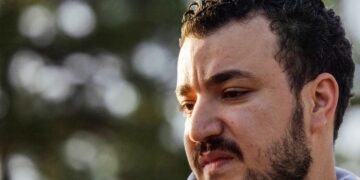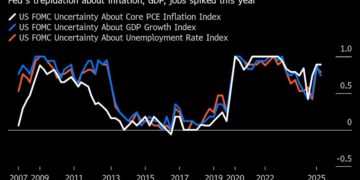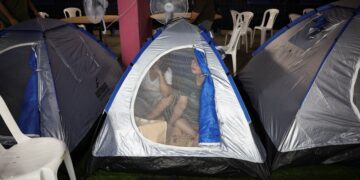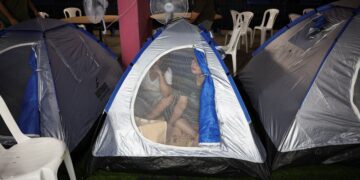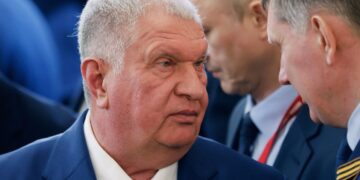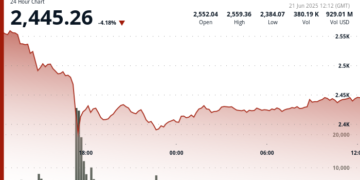ISTANBUL/JERUSALEM (Reuters) -Iran deems European proposals to curb its nuclear programme unrealistic and a hurdle to agreement, a senior Iranian official said on Saturday, while Israel said it killed a veteran Iranian commander during attacks by both sides.
The more than week-long air war between longtime foes Israel and Iran continued with reports of strikes on an Iranian nuclear facility. The U.S. was weighing whether to back Israel in the conflict while other powers urged de-escalation.
Iran’s Foreign Minister Abbas Araqchi met British, French and German counterparts, plus the EU, on Friday in Geneva in search of a path back to diplomacy and a possible ceasefire.
But proposals made by the European powers were “unrealistic”, the senior Iranian official told Reuters, saying that insistence on them would not bring agreement closer.
“In any case, Iran will review the European proposals in Tehran and present its responses in the next meeting,” the official said, adding that zero enrichment was a dead end and Tehran would not negotiate over its defensive capabilities.
Israel launched attacks on June 13 saying Iran was on the verge of developing nuclear weapons, while Iran says its atomic programme is only for peaceful purposes. Israel is widely assumed to possess nuclear weapons, which it neither confirms nor denies.
Israeli Defence Minister Israel Katz said that Saeed Izadi, who led the Palestine Corps of the Quds Force, the Iranian Revolutionary Guards’ overseas arm, was killed in a strike on an apartment in the city of Qom.
Calling his killing a “major achievement for Israeli intelligence and the Air Force”, Katz said Izadi had financed and armed the Palestinian militant group Hamas ahead of its October 7, 2023, attack on Israel, which triggered the war in Gaza.
The Revolutionary Guards said five of its members died in attacks on Khorramabad, according to Iranian media. They did not mention Izadi, who was on U.S. and British sanctions lists, but said Israel had also attacked a building in Qom, with initial reports of a 16-year-old killed and two people injured.
HUNDREDS KILLED
At least 430 people have been killed and 3,500 injured in Iran since Israel began its attacks, Iranian state-run Nour News said, citing the health ministry.
In Israel, 24 civilians have been killed by Iranian missile attacks, according to local authorities, in the worst conflict between the longtime enemies.
At a meeting of the Organisation of Islamic Cooperation (OIC) in Istanbul, Araqchi said Israel’s aggression, which he said had indications of U.S. involvement, should stop so Iran can “come back to diplomacy”.
“It is obvious that I can’t go to negotiations with the U.S. when our people are under bombardments under the support of the U.S,” he told reporters on the sidelines, before meeting Turkish President Tayyip Erdogan.
The top Iranian diplomat said U.S. involvement in the conflict would be “very dangerous”. Araqchi is set to visit Moscow, Iran’s ally, on Monday.
President Donald Trump has said he would take up to two weeks to decide whether the United States should enter the conflict on Israel’s side, enough time “to see whether or not people come to their senses”, he said.
Iran would be able to have a nuclear weapon “within a matter of weeks, or certainly within a matter of months”, he said on Friday, adding: “We can’t let that happen.”
Yet in March, Tulsi Gabbard, his national intelligence director, testified to Congress that the U.S. intelligence community judged that Tehran was not working on a nuclear warhead.
The International Atomic Energy Agency said that a centrifuge manufacturing workshop at the Isfahan nuclear facility, one of Iran’s biggest, was hit – but added it contained no nuclear material.
Gulf Cooperation Council ambassadors expressed concerns to U.N. nuclear watchdog chief Rafael Grossi about the safety of nuclear facilities close to their countries and “dangerous repercussions” of targeting them, Qatar state news agency said.
Israel said it was attacking military infrastructure.
INTERCEPTIONS OVER TEL AVIV
Early on Saturday, air raid sirens were triggered across parts of central Israel and in the Israeli-occupied West Bank, with missile interceptions visible over Tel Aviv and explosions echoing. There were no reports of casualties.
The Human Rights Activists News Agency, a U.S.-based rights organisation that tracks Iran, gave a higher death toll than Tehran, saying Israeli attacks have killed 639 people there.
Those killed in Iran include the military’s top echelon and nuclear scientists. Israel said it also killed a second commander of the Guards’ overseas arm, whom it identified as Benham Shariyari, during an overnight strike.
Iran’s health minister, Mohammadreza Zafarqandi, said Israel has attacked three hospitals during the conflict, killing two health workers and a child, and has targeted six ambulances, according to Fars.
Asked about such reports, an Israeli military official said that only military targets were being struck, though there may have been collateral damage in some incidents.
An Iranian missile hit a hospital in the southern Israeli city of Beersheba on Thursday.
Turkey, Russia and China have demanded immediate de-escalation.
Despite the downbeat assessment from the senior Iranian official, French President Emmanuel Macron said he and Iranian counterpart Masoud Pezeshkian agreed on a Saturday call to accelerate talks.
Israel says it will not stop attacks until it dismantles Iran’s nuclear programme and ballistic missile capabilities, which it views as an existential threat, saying this could take more than a few weeks.
(Reporting by Reuters; Writing by Jonathan Spicer in Istanbul; Editing by William Mallard and Andrew Cawthorne)
By Parisa Hafezi and Emily Rose

